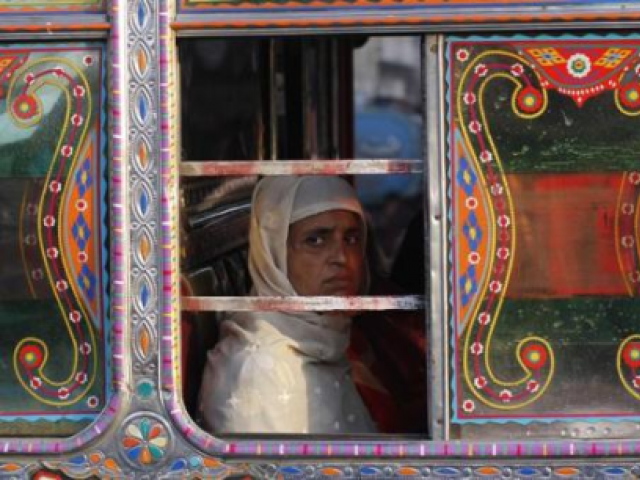Left to roast: Women rue lack of shaded bus stands in the city
Say men seldom leave seats for them in those that exist

PHOTO: REUTERS/FILE
Many of these people are domestic workers and have to travel to the suburbs for work.
Sadaf Bibi, 40, works as a housemaid in Hayatabad town. She leaves home for work early in the morning and returns later in the day after travelling for over an hour.
She tells The Express Tribune there are no shaded areas for women in Hayatabad even though it is a posh locality.
“I wait on roads till the bus arrives,” says Sadaf Bibi, who heads a union of over 100 domestic workers. She adds the heat is becoming unbearable and fears what may happen during Ramazan.
Waiting areas with proper shades have been constructed at some prominent bus stops of the city.
“However, it is mostly packed to the brim by men who wait for public transport,” she says.
“There is a need for separate shaded areas for men and women at each and every bus stop.”
Rights activists are also concerned about the lack of proper waiting areas for women who, in some cases, have to travel seven days a week to their workplaces.
Aware Girls Organisation Provincial Coordinator Kiran Fida is working for the rights of domestic women workers.
According to Fida, women are facing tremendous hardships and the lack of shaded waiting areas, especially in the scorching heat, is adding to their woes.
The first-ever union of over 100 K-P female domestic workers named Hunarmand Mehnatakash Khawateen Association was established in 2015 in the city with the support of Aware Girls. Fida, who manages the union, says one of the major problems domestic workers face is uncomfortable transportation.
These workers are mostly from financially disadvantaged backgrounds and cannot afford taxicabs. As a result, they wait for buses and wagons used for public transport. Fida adds these buses are overcrowded and that they even don’t get a seat on certain occasions.
“There are hardly between five to 10 seats reserved for women in buses,” she adds. “When they do not get seats, their wait for the next bus becomes unbearable.”
Many other women who travel by public transport to reach their offices and educational institutions also face similar challenges. The bus stop in front of University of Peshawar becomes crowded during closing time.
Many students are made to stand by the roadside and wait for the bus to take them home. The waiting area constructed at the same stop can hardly accommodate 10 people, says Samina Gul.
“Women cannot sit alongside men in the waiting areas due to cultural restraints,” she says.
“I strongly urge the relevant authorities construct a separate shaded area.”
Ceena Naeem, a freelance journalist based in Peshawar, often travels by public transport to cover events in the city. Naeem says the main problem she has experienced is the attitude of men who never bother to leave a few seats vacant for women in the already existing shaded areas. She also proposes that separate women-only buses be offered for commuters.
Published in The Express Tribune, May 23rd, 2016.













COMMENTS
Comments are moderated and generally will be posted if they are on-topic and not abusive.
For more information, please see our Comments FAQ